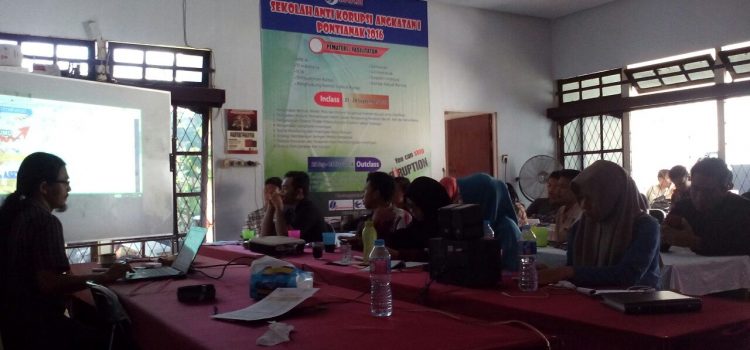
School of Anti-Corruption continued the training on the next material. The material which would be discussed was related to Corruption on Budgeting Sector (APBN/APBD/Village Fund), which was held at the Office of Swandiri Institute, at 15.00 – 17.30 WIB, on Thursday/September 22, 2016.
Regarding the agenda of the material, it was facilitated by one of the senior activists in West Kalimantan, Muhammad Lutharif who is also the Director of one of the Non-Government Organizations, Kontak Rakyat Borneo, and a former activist of Gemawan.
According to Muhammad lutharif, who is usually called Anong, to review corruption cases nowadays after the Post-Reformation Era, the public is facilitated by the existence of Law No. 14 of 2008 concerning Openness of Public Information.
In addition, Anong continued, with technology which makes it easier to monitor budgets, one of the systems published is the E-Procurement Service (LPSE), which is one of the websites that opens information regarding the procurement of State Project auctions.
Directly, in the supervision of every budgeting, the public will be able to update it for analysis related to misappropriation of each budgeted state project, moreover there is authority and openness of the media in publishing news related to corruption cases.
In the context of corruption cases, the primary issue is the Markup and Markdown Budget, while the level of difficulty in monitoring the Markdown of the budget, plus corruption in the sector of Natural Resources in granting concessions to land permits in the community.
Basically, the corruption cases that occur are started at the planning stage of every development which is frequently debated regarding the planning stage of the Medium-Term Development Plan (RPJM) which became the strategy of political elite authorities in the designs vulnerable to indications of corruption
In this regard, the context of budget monitoring is more focused on the House of Representatives. No doubt that every development plan is designed by the Legislature.
Moreover now, the presence of Village Law No. 6 of 2014, which gives the villages full authority in regulating each of its development budgets, even until the stage of village budget planning is also based on the village RPJM (Medium-Term Development Plan) called RPJMdes. This has also become one of the important sectors for the community in monitoring the village budgets in each respective region.
Anong added, the Regional Original Revenue (PAD) also experienced a budget deficit compared to the expenditures. This has also become our homework in monitoring our own regional budget, especially on Regional Original Revenue.
“In fact, there are some regions in which, until now, their PAD are much lower than their regional expenditures. This is harmful to the country as well. With the tax revenues which are much smaller, there is no doubt that the country is always harmed due to a political policy related to autonomous regions which do not meet the standards to become New Autonomy region,” Anong confirmed. (WLY)
